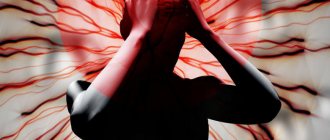- 22 JAN 17
- Vasilyeva Olga
- Articles
Author: Vasilyeva O.B.
In this article, you will learn about the psychological mechanisms behind trembling and how to cope with it.
Tremor that occurs with excitement is a normal physiological reaction of the body to stress. Almost every person has at least once felt trembling in stressful situations: during exams, in driving school or during public speaking.
But some people experience tremors more often and more severely than others. When trembling in the hands becomes noticeable, it begins to cause inconvenience: it is impossible to calmly eat soup, it is difficult to write legibly, and change at the cash register tends to fall on the floor. Tremor becomes a disaster for those whose work involves small precise movements: for shooting athletes, surgeons and dentists. Some public figures, teachers and actors struggle with trembling in front of an audience.
It happens that shaking in the hands is accompanied by a shaking neck and head. Shaky legs bother many novice drivers, and a shaky voice bothers lecturers.
In my first year at the institute, I met Veronica. She was a slender, pretty, slightly shy girl. Every time she answered at the board, her hands were noticeably trembling with excitement. And during the exams, the trembling intensified and covered the whole body.
During one of the subjects, we were given the task of approaching a stranger on the street and asking him the question “How to get to the Kremlin?” It so happened that we went to complete the task together with Veronica. Already going outside, Veronica began to shake. And when we chose the “candidate” to whom we would ask our question, my head began to visibly shake. Despite this, Veronica completed the task.
On our way back, Veronica and I started talking. She told me about herself.
“I started getting tremors in my hands when I was nervous at the end of school. At first the hand trembling was almost unnoticeable. But one day a “kind” classmate laughed at his shaking hands. From then on, I tried to control my trembling. And the more I tried to control my body, the stronger the tremor became. Now, when I get nervous, my hands shake.”
We became friends with Veronica. When she went to psychotherapy, she shared her discoveries with me. What I learned from Veronica about tremor later helped many of my clients.
Main causes of tremor
If a noticeable tremor is directly related to stress , this indicates its purely psychological nature. This means there are two ways to deal with tremors. One of them gives a temporary effect - this is taking psychotropic drugs, the second gives a lasting effect - this is working with a psychologist or psychotherapist.
Very often, trembling during excitement is associated with social anxiety (social phobia).
Sometimes tremors are caused by several reasons , for example, both your genetics and a psychological reaction to stress.
another reason along with the psychological cause , then you should go to a neurologist.
The doctor will rule out a number of diseases and reactions that cause tremors. Here are some of them:
- Response to physical activity;
- Consequences of taking alcohol and drugs;
- Reaction to drugs;
- Genetic predisposition;
- Parkinson's disease;
- Consequences of traumatic brain injury, stroke or brain tumor;
- Hyperthyroidism;
- Liver or kidney failure;
- Dystonia;
- Polyneuropathy.
However, if tremor manifests itself specifically during communication, then you should consult a psychologist, even if you have determined that the cause of the tremor is a disease, a reaction to stress, or psychoactive substances.
Trembling hands
A superficial attitude towards hand tremors can lead to more serious consequences. The paradox is that at the slightest trembling, people begin to experience even greater anxiety, aggravating their condition. Sometimes it passes quickly without causing exacerbations. When excited, your hands begin to tremble due to the production of excessive amounts of adrenaline. If its dose is exceeded, then external manifestations occur, including hand tremors.
Tremors are classified according to:
- duration - short and long;
- direction - one-sided and symmetrical;
- frequency - low and high;
- degrees of control - controlled and uncontrolled;
- sources of occurrence - physiological and pathological.
Causes of hand tremors
The causes of tremor are divided into 2 large groups.
- Physiological - caused by processes occurring in the life of an individual.
- Pathological - associated with human diseases, some of which are serious.
Pathological tremor
This form of disorder is provoked by individual diseases or occurs together with them, being one of the symptoms. Varieties of pathological tremor can be caused by:
- Parkinson's and Alzheimer's diseases in older people;
- multiple sclerosis;
- benign and malignant brain tumors;
- head injuries, mainly associated with damage to the cerebellum;
- diabetes, anemia;
- liver damage;
- dysfunction of the thyroid gland;
- osteochondrosis;
- micro-strokes;
- hereditary diseases of a genetic nature;
- damage to the nervous system, encephalitis tick bite;
- sudden changes in blood pressure.
The diseases listed above affect people of all ages: children, the elderly, and people of working age. It is necessary to get rid of these diseases or remove the acute phase, then hand tremors will disappear.
Physiological tremor
Hands also shake when exposed to various external factors:
- extreme irritability of the subject, who reacts sharply to everything happening around him;
- reactions to changes in air temperature;
- strong physical activity;
- chronic depression;
- alcohol abuse;
- poisoning with toxic substances - carbon monoxide, mercury, drugs;
- long interaction with small objects, the symptom is typical for representatives of certain professions - jeweler, watchmaker, craftsman, seamstress;
- side effects of certain drugs;
- constant consumption of coffee.
In most cases, it is enough to remove the factor that provokes hand tremors, and everything will work out, but this does not always happen. You may need to see a doctor.
What to do if your hands shake when excited?
- Contact a psychologist or psychotherapist
Psychotherapy is the most reliable way to cope with tremors caused by anxiety. Psychotherapy may require a certain investment of time and money, but the results are stable.
- See a psychiatrist
Psychotherapy does not give immediate results. Therefore, if you need to quickly cope with tremor, you should consult a psychiatrist for medications. When taking medications, hand tremors during anxiety decrease or disappear, but only while taking the medications.
- Contact a neurologist
If you are not sure about the purely psychological nature of tremors, then you should make an appointment with a neurologist to rule out other causes of hand tremors during excitement.
- Find appropriate self-help methods
You can read about self-help methods at the end of the article.
Hand tremors
Thyrotoxicosis
Diabetes
Stroke
Encephalitis
27314 November 25
IMPORTANT!
The information in this section cannot be used for self-diagnosis and self-treatment.
In case of pain or other exacerbation of the disease, diagnostic tests should be prescribed only by the attending physician. To make a diagnosis and properly prescribe treatment, you should contact your doctor. Hand tremors: causes of occurrence, what diseases cause them, diagnosis and treatment methods.
Definition
Tremor is a medical term for trembling in various parts of the body caused by contraction of antagonist muscles. Hand tremor can be either a physiological reaction of the body to severe fear, fatigue, hypothermia, alcohol intoxication (physiological tremor), or a symptom of a number of serious diseases (pathological tremor).
Types of tremor
By localization:
- focal tremor - affects only one anatomical area, for example, arms, head, jaw;
- segmental tremor - involves two or more adjacent parts of the body, for example, tremor of the arms and head;
- hemitremor – trembling spreads to several areas of the body on one side;
- generalized tremor - trembling is widespread and affects simultaneously the arms, legs, head, tongue and voice.
In relation to movement:
- rest tremor;
- action tremor.
According to the vibration frequency,
hand tremors are divided into 3 groups:
- low frequency (less than 4 Hz);
- mid-frequency (4–8 Hz);
- high frequency (8–12 Hz).
The amplitude of
the vibration is divided into:
- to low amplitude,
- medium amplitude,
- high amplitude.
According to severity:
- slight tremor;
- moderate tremor;
- significant tremor;
- pronounced tremor.
Depending on the cause:
- hereditary;
- acquired.
Based on the presence of accompanying symptoms:
- isolated - tremor is the only symptom;
- combined – other neurological symptoms are present.
Possible causes of hand tremor
Physiological tremor is called tremors in the hands against the background of emotional overexcitation, fatigue, fever, after heavy physical exertion, when taking certain medications, coffee, alcohol, or smoking. This type of tremor usually goes away on its own once the underlying cause is eliminated.
Pathological tremor can be a symptom of a fairly large number of diseases.
Endocrine disorders When
the level of thyroid hormones is elevated,
a person often experiences trembling in his hands. In addition, there may be weight loss with increased appetite, muscle weakness, a feeling of heat at room temperature, the skin becomes warm and moist, the heart rate increases, the patient becomes quick-tempered, overly emotional, and the volume of the thyroid gland gradually increases.
In patients with diabetes mellitus
with a sharp decrease in blood glucose levels, not only trembling of the hands, but also clouding of consciousness, even fainting, may be observed. Patients with diabetes need to control their sugar levels and not skip meals.
Metabolic disorders In a rare hereditary disease - Wilson-Konovalov disease
– hand tremors can appear at a young age. The cause of the disease is a violation of copper metabolism in the body; it begins to be deposited in the tissues of organs, disrupting their functioning.
Pathologies of the cardiovascular system
Patients with hypertension
may experience tremors in their hands when their blood pressure rises sharply.
Neurological pathologies Parkinson's disease
– a slowly progressive neurological disease, most common in older people. The exact cause of this disease is still not clear. In Parkinson's disease, hand tremors are one of the first symptoms, appearing at rest, and are eventually joined by head tremors. The tremor increases with excitement and physical activity; in addition, there is an imbalance, muscle weakness, gradual decline of cognitive abilities, memory loss, and depression.
Currently, Parkinson's disease is incurable, but existing treatment methods, especially with timely diagnosis, significantly improve the course of the disease.
Lesions of the cerebellum
as a result of cancer, trauma, encephalitis or stroke are characterized by the so-called large-scale tremor. In addition to trembling, gait and coordination of movements are impaired.
Essential tremor is distinguished separately
. This is a hereditary disease of the nervous system, in which there is a moderate intensity trembling of the hands that occurs during movement and gradually progresses. The disease often begins in middle age, does not affect other body functions, and does not affect mental abilities or memory. In old age, tremor increases, which can lead to a significant decrease in quality of life.
Essential tremor is often mistaken for Parkinson's disease, a much more serious disease that leads to severe disability.
Diseases of the musculoskeletal system In some cases, osteochondrosis of the cervical spine
may cause trembling and numbness in the hands.
Autoimmune diseases
Tremor in
multiple sclerosis
is one of the most common symptoms, and tremors appear not only in the hands, but also in other parts of the body.
Another possible cause of hand tremors is poisoning with toxic substances.
, for example, carbon monoxide, salts of heavy metals.
This is a life-threatening condition that requires immediate medical attention. Trembling hands can become a side effect when taking certain medications (neuroleptics, antidepressants, psychostimulants, some antiarrhythmic drugs, medications for bronchial asthma, etc.).
Which doctors should I contact for hand tremors?
Hand tremors may occur in emergency situations. Increased blood pressure, a sharp decrease in glucose levels in patients with diabetes, injury, stroke - these conditions require immediate medical attention.
In other cases, the first specialist to whom patients turn when tremors appear in their hands becomes. If necessary, consultation may be required; , psychotherapist.
Diagnosis and examinations for hand tremors
Primary diagnosis consists of examining the patient and carefully collecting anamnesis, the doctor specifies the time of onset of the problem and accompanying symptoms, asks the patient to perform several tests: for example, pour water from a cup, write something with your eyes closed (Gibson and Khersonsky maze test), etc. d.
To identify the cause of tremor, or more precisely, the disease that caused hand tremors, laboratory and instrumental diagnostics are prescribed.
Laboratory tests
- To exclude endocrine pathologies, a blood test is performed for thyroid hormones (free thyroxine (T4), free triiodothyronine (T3)), thyroid-stimulating hormone (TSH), antibodies to thyroid peroxidase, antibodies to thyroglobulin, and the level of insulin and cortisol is examined.
Trembling is an ancient means of communication
There is an opinion among psychologists that trembling is an ancient adaptive mechanism.
Imagine a clan of ancient people. To survive in harsh conditions, they need to stick together. After all, alone there is little chance of building a reliable shelter, getting food for yourself and driving away large predators. In order for a group of people to stick together, excitement and aggression must be controlled. We need clear signals that will make it clear what is happening to a member of the community.
For example, two men stand opposite each other, and each wants to become a leader. The fact that their hands are shaking with excitement informs everyone around them that men are extremely excited, they can barely contain themselves and their energy is about to splash out. This is a signal to others to “Move away!”
Each man mentally evaluates his strength and the strength of his opponent. One of them feels that he is stronger. Because of this, he perceives his trembling as aggression ready to manifest itself, he scares the opponent with his roar, he is preparing to fight. The other man is not sure of victory, so he perceives his trembling as a manifestation of fear, he will prefer not to get involved in a fight and will move away. Thanks to trembling, it was possible to avoid direct clashes and bloodshed.
Animals also have similar bodily signals; for example, cats’ tails twitch in stressful situations.
Why do my hands shake when excited?
Towards graduation, Veronica went to psychotherapy. And she told me about her discoveries about the causes of trembling.
Containment
In working with a psychologist, Veronica discovered that trembling was directly related to her restraint. It turned out that without realizing it, she was holding back her indignation, manifestations of fear, her anger and rage, her delight and excitement. The only hint of suppressed emotions was trembling. Over time, Veronica realized that there was no great need to keep all her reactions to herself. Psychotherapy taught her to be more spontaneous and open. This reduced Veronica's general anxiety, reduced bodily tension and freed up a huge amount of energy in Veronica, which had previously been spent on suppressing natural reactions. Veronica began to look more relaxed and calm.
The human body reacts in certain ways to stressful events. First, the brain and adrenal glands produce stress hormones. Hormones prepare a person for active physical action, and for this purpose the pulse quickens, the muscles become toned, the pressure rises, and the breathing rate increases. This is the so-called “fight or flight” reaction, which previously helped ancient man to be stronger, faster and more agile, and therefore helped him to survive.
If a person is forced to remain motionless during the release of hormones, tension grows inside him. It is this internal tension that manifests itself in the form of trembling. Suppression takes a colossal amount of energy. Holding back the trembling leads to increased tension, which means an increase in tremors.
Trembling is more pronounced in those people whose bodies react more strongly to stress. And also for those who are not used to being emotional, but strive to be restrained and rational.
Focusing
Veronica also said that if she pays attention to her hands, she asks herself the question “Are my hands shaking?” - this leads to trembling.
It turns out that there is such a rule: if you focus your attention on any part of the body, this leads to changes in how it works. You can conduct this experiment yourself.
Go to a quiet, peaceful place. Sit comfortably. Direct your inner gaze to the big toe of your left foot. Feel how your thumb touches your index finger as it touches the floor. If you are wearing shoes, feel them with your finger. Listen to the sensations in your finger - whether it is warm or cold, whether it is relaxed or tense, whether it is comfortable in the shoe. Focus your attention on the big toe of your left foot for 3 minutes, try to keep your attention on the sensations in it. After 3 minutes, describe how your finger sensation has changed since the beginning of the experiment. Most people feel the difference.
Focusing on the sensations in the hands and thoughts about trembling leads to increased tremors. Therefore, in stressful situations, transfer your attention to other things.
Fear of making a bad impression
Veronica told me that during therapy she realized how much she wanted other people to like her. She had an image of what an ideal girl should be. Deep down, she knew that she did not fit this image. She felt that if she relaxed, everyone would laugh at her, judge her, or reject her. In the process of working with a psychologist, Veronica decided that she was not $100 to please everyone. Now she is not afraid of ridicule from strangers. And as her fear diminished, so did her tremors.
With the fear of not being liked, a person feels like a small child. It seems that only those around you know what is good and what is bad. It’s as if there are all judges and prosecutors around. In fact, the toughest accuser is on the inside. As practice shows, people think only about themselves and rarely notice others. The thought is quite unpleasant: “No one really cares about me, except the people who are very close to me.” In addition to the fact that this thought quite accurately reflects reality, it helps to be a confident person.
In psychotherapy, you can quiet the voice of your inner critic.
Vicious circle
The thought that other people will notice the trembling makes it worse. A vicious circle is formed in which this thought causes fear of making a bad impression, which leads to the release of stress hormones. Hormones trigger the body's response to stress. When the fight or flight response is suppressed, tremors occur.
False Self
While working with a psychologist, Veronica discovered that she behaves the way other people want. She considered herself sociable and non-conflict. Gradually she began to realize that she was not really what she had thought before. Veronica realized that not all people liked her. I realized that I love solitude and walks in nature. Who prefers reading a good book to a fun party. She realized that sometimes she gets angry and wants to defend her interests.
As a rule, trembling is characteristic of those people whose parents and educators achieved ideal obedience (complete inhibition of natural reactions) in a variety of ways. Some were scolded in childhood, others were beaten, others were condemned or showered with contempt, and others were stopped from speaking as punishment. As a result, they hid their natural, spontaneous part deep inside themselves. Without realizing it, they began to show the False Self, and the Natural Self was imprisoned within.
Particularly severe trembling is characteristic of people with a stormy temperament, when they hide their strength and activity. Their irrepressible energy bursts out trembling.
Psychotherapy helps to identify and neutralize the psychological mechanisms of trembling.










